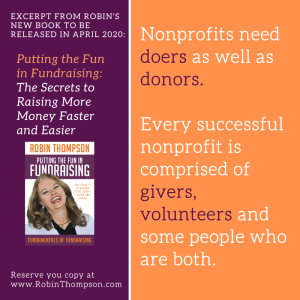
During the past week:
- I was introduced to someone and both of us looked down at our hands and at each other. We smiled and decided to just skip the typical handshake.
- At church when it was time to “pass the peace” and say hello to other people, the minister advised us not to shake hands and bump elbows instead.
- Some conferences have been cancelled. At the ones still scheduled, the planners have instituted a “no handshake” policy.
If you are like me, going about my day, I am becoming extra, extra cautious. How do I open that door without touching the handle? And then, if I do touch it . . . Quick! Where is the hand sanitizer? I ask myself, do I want to go to any event where there will be a lot of people crammed in one room?
I’m not a doctor, and I don’t even play one on TV, but this is more than somewhat unsettling.
Now what happens when you take that concern into our fundraising world? Our life is spent in coffee shops, restaurants, and other public places where we meet with donors and volunteers. You may be wondering, “How am I supposed to do my job?”
In one donor’s signature line on the bottom of his email it read, “I have not traveled to any areas with CO VID 19 and I do not have any symptoms!” This may be the new normal.
What does this mean for those of us who rely on face-to-face meetings with donors, volunteers, or even attending events?
And the Survey Says . . .
Some recent surveys asked nonprofits if they see an impact to fundraising because of the concerns of the virus and the dive in the stock market.
The March 4th, 2020, Chronicle of Philanthropy reported that “More that ½ of fundraising consultants expect that the recent stock market declines fueled by coronavirus fears will hurt fundraising over the next three to six months.”
A study conducted by The Nonprofit Alliance on March 4th, described that one quarter of those surveyed were concerned that a pandemic would impact their fundraising efforts. One third were concerned about a financial crisis effecting fundraising, and over half believe that the abrupt stock market drop will have an impact on fundraising.
Those of us who are dependent on donors’ dollars must find a way to overcome it.
Historical Giving During Economic Downturns
If you were in fundraising in 2008 after the financial crisis, you may have read stories about how organizations backed off from asking for donations and in some cases didn’t even do much stewardship. Some development departments even reduced staff. I was working in a nonprofit where the development staff was reduced from 11 people to 2.3. I found it was important to have the discipline to continue fundraising and outreach to donors.
In my new book, Putting the Fun in Fundraising: Secrets to Raising More Money Faster and Easier, I explain that this is similar to what happened in 2008. Then and now, the fact is that philanthropic people are philanthropic regardless of the economy. They may not give as much money as they did in better financial times, but they will still give. People who give to charities do so because they feel it is important to support those organizations, and unless they are in dire financial straits, they will still give money.
Solution: Keep the Momentum
Even though our tendency may be to back off fundraising efforts during a turbulent economy, keeping the momentum is a better idea. During this time, find a way to honor and recognize your donors.
- Send them a thank you note from a student who received the scholarship they established.
- Have a board member acknowledge that they appreciate the work the volunteer or donor has done.
- A personal phone call just to express gratitude without asking for a gift will surprise and please the donor.
Recently, an experienced fundraiser described a donor who had consistently given $50,000 annually until economic conditions caused him to not be able to give as much for a few years. The fundraiser kept in touch with the donor during the down time, and the following year the donor gave $100,000.
My advice during these times is to find ways to keep in touch with the donors. If you sense that they are nervous about meeting you in public or don’t invite you into their home because of the virus, have a phone conversation and plan to meet when everyone feels the major threat has passed.
Join me in being creative, staying in touch with donors, and finding ways to have fun with FUNdraising.
Robin Thompson has been called a fundraising therapist. She is a consultant who helps nonprofit organizations raise more money faster and easier; coaching people who work in nonprofits to be more effective. Her new book, Putting the Fun in FUNdraising: Secrets to Raising More Money Faster and Easier, will be released early April 2020. Reserve your copy at www.RobinThompson.com.




